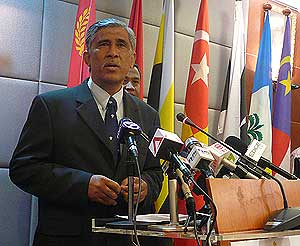The Malaysian Anti-Corruption Commission's move to invoke Section 29(4) of the MACC Act is counter-productive and superfluous, said a parliamentarian and legal experts.
"I understand that investigations should be kept under wraps to avoid people destroying evidence but in the Malaysian context (the commission) needs to gain the public's trust," said Bar Council president Kesavan Ragunath.
 Newly-minted MACC chief commissioner Abu Kassim Mohamed (
left
) yesterday said that the commission will
invoke
the act against those who disseminate information about their corruption complaint to the media.
Newly-minted MACC chief commissioner Abu Kassim Mohamed (
left
) yesterday said that the commission will
invoke
the act against those who disseminate information about their corruption complaint to the media.
When contacted, Ragunath said that invoking the law gives the impression of further lack of transparency, and will be an unwelcome blow to the commission's ailing public image.
He added that invoking the law would deter people from coming forward to lodge a complaint with MACC.
"Before, people use to think that if MACC does not act on their complaint, they can go to the media," he said, citing the Port Klang Free Zone (PKFZ) fiasco as an example of the media's role in highlighting issues of corruption.
But with the MACC invoking this law, those wanting to lodge a complaint would opt to go straight to press, he added.
Invoking the law also discourages complaints because there will be no way to know the progress of a complaint.
‘ Stop intimidating the public'
"Someone can lodge a complaint with all the evidence and not get any feedback for a year, as the MACC is not compelled to provide progress reports," he said.
As such, a way forward is to guarantee by the commission to get back to complainants within a stipulated time frame, he said.
Another idea, said University Malaya law lecturer Johan Shamsudin Sabarudin, is to cut back on "warnings" such as the one issue yesterday, which "appears like an attempt to intimidate the public".
"It gives the impression that the MACC is untouchable," he said.
Johan told Malaysiakini that the MACC can only garner public support if they act on large corruption cases, hence proving that "they are not a tool of the government".
However, both law experts said that the fact remains that the section of the law does exist, and it is the MACC's right to invoke it.
"Unless there is a change in the law, the chief commissioner is justified in invoking it, whether or not it affects their public image," Johan said.
Act won't deter sham complainants
 Like the law experts, Segambut MP Lim Lip Eng said that the law is a bad idea, not because it hurts the commission's public image, but because it is useless to deter people from lodging complaints to seek publicity.
Like the law experts, Segambut MP Lim Lip Eng said that the law is a bad idea, not because it hurts the commission's public image, but because it is useless to deter people from lodging complaints to seek publicity.
This is because those who lodge complaints "with ulterior motive to hurt someone" can lodge a complaint with the police, which in fact, should be the standard procedure for complaints in corruption.
"The Criminal Procedure Code (CPC) 1999 does not ban a complainant from ‘disseminating' information of police complaint to outsiders," he said in a statement.
Lim, also a lawyer, added that the MACC can use other laws to "prevent those complainants with hidden agendas other than wanting to curb corruption".
"The authorities can charge them under Section 177 of the Penal Code for furnishing false information on any subject to any public servant as true," he said.
Likewise, the MACC can also invoke Section 499 of the same Act for criminally defaming the innocent, an offence, which like that under Section 177 is punishable with imprisonment.
Johan agreed that the sections of the Penal Act can be invoked for the same purpose, but disagrees that it is a complete alternative to the section of the MACC Act.
"Given the peculiarity of the offence, the Section 29(4) of the MACC Act is the best provision for the chief commissioner to use," he said.

